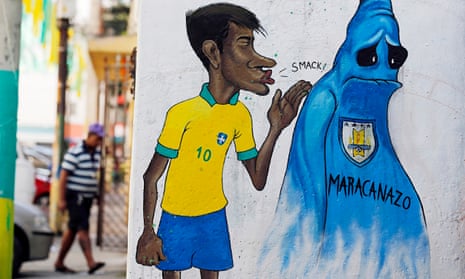Ever since nearly 70,000 Uruguayans were packed into Montevideo’s Estadio Centenario to see their heroes win the 1930 World Cup final, with tens of thousands more locked outside waiting to hear word, it has been clear that the performance of the host nation is an integral part of any World Cup story.
There have been no full-on hosting misfires, which is not bad going since we’re up to tournament 20. Chile were minnows in 1962 but fought their way to the semis anyway, propelled by a joyously boisterous Santiago crowd. The Swiss side of 1954 never had a hope of winning the trophy but in losing their quarter-final 7-5 to Austria did their bit in raising the goals-per-game tournament average to a never-to-be-beaten 5.38. The 2002 competition – surely the most eye-wateringly dull of all time – would have been a total write‑off had South Korea not made their improbable run to the last four. Even South Africa, the only hosts never to make it past the group stage, signed off their 2010 campaign with a resounding victory over France, finalists four years earlier, providing the home support with enough puff to power their vuvuzelas until the party was over.
But the most vivid tournaments are the ones where the host nation harbours serious designs on the title. Argentina 1978. France 1998. England 1966. West Germany 1974. Hope replaced by expectation, fever ratcheted up, home advantage cancelled out by grotesque levels of pressure. Though that never stops the other nations turning up with the nagging feeling that they’re entering the lion’s den with neither whip nor chair. It’s a perfect balance, a perfect storm.
Sometimes expectant hosts are swept away. Italy’s failure in 1990 was a tragedy of operatic proportions, Diego Maradona of Napoli craftily plunging the country into north-versus-south civil war before his Argentina side did for a spooked Azzurri. But that was nothing on Brazil’s travails at their own World Cup of 1950. An epic, widescreen, almost unfathomable fable of hubristic comeuppance, it is the greatest sporting story ever told. Brazil were brilliant in the final pool: their free-scoring team thumped Sweden 7-1 and Spain 6-1, and required only a draw in their final match against Uruguay to lift the trophy. Having beaten the Uruguayans 5-1 in Rio the year before, it looked a shoo-in. Celebratory sambas were written; speeches and toasts were made on the field before kick-off; morning newspaper headlines claimed victory with a breezy confidence not displayed since Dewey defeated Truman.
And then along came obdurate Obdulio Varela, the Uruguay captain, who masterminded a 2-1 victory that silenced the Maracanã. The new stadium, the biggest in the world, was instantly reduced in stature from monument to folly. Afterwards Brazil changed their shirts from white to yellow in a fit of superstitious pique, discovered some of the greatest players in the history of the game, from Didi, Pelé and Garrincha to Romário and Ronaldo, via Jair and Gerson in between, and won five World Cups. And yet there’s still an itch.
Which brings us to 2014, where the performance of the hosts dominates the narrative as never before. Forget the quality of the football; one of the main reasons this World Cup has been so enjoyable thus far is the febrile atmosphere in the stadiums, as Brazil gears up to lifting the trophy on home soil at long last, banishing the ghosts of 1950 for good. Enjoy the party, everyone, should Luiz Felipe Scolari’s side manage it. But for the sake of football, it’ll surely be for the best if, just like 64 years ago, not a note of celebratory samba is played.
No ill will is intended. It’s just that the 1950 story is simply too good a yarn to be retrospectively compromised, as it would be, fatally, should Brazil win at home this time round. A victory would ensure that the greatest sporting story ever told would become nothing more than a chapter of a fairytale with a Disney ending. And there’s nothing more boring at the pinnacle of sport.
Take Don Bradman, who will forever be remembered trudging back to the Oval pavilion having been bowled by Eric Hollies for a duck, with a final Test average of 99.94. Alex Ferguson’s stellar managerial career, meanwhile, ended with his side shipping a three-goal lead in the last nine minutes of his final match. It’s nice to know that sport finds a way to remind even the greatest who’s boss.
Brazil’s inability to get the job done at home is part of that tradition. Football has found a way to flummox the most storied, most successful World Cup nation of all. For the good of the game’s ecosystem, that should continue. And it would be to Brazil’s benefit, too: the world fell in love with Brazilian football because of its glorious imperfections. Nobody would have been able to stomach a relentless five-times champions if there wasn’t something nagging away at them, despite all the victories.
So another defeat on home soil might be the best thing all round. Nothing could ever be as seismic as 1950 but Brazil’s first competitive loss at home since 1975 would come close. Defeat to Uruguay in the quarter-finals, perhaps, or maybe a last-minute loss in the final against Argentina.
Short-term pain and sorrow for the home nation guaranteed, but the benefits are there for all: the legend of 1950 remains unsullied, the 2014 World Cup has its own story for the ages, and Brazil move on to 2018, still with that gap on the CV, but still beloved by all. Who but a churl could then deny Brazil their sixth World Cup in Russia? Another happy ending, of sorts. Just not the fairytale they’ve longed for.
